Overview
Latvia has two offences that specifically criminalise HIV transmission (along with hepatitis B and C). Importantly, both require transmission to occur; mere ‘exposure’ is not sufficient.
Article 133 of the Criminal Law criminalises ‘deliberate’ infection with HIV (or hepatitis B or C) with a maximum prison term of five years. Other available penalties include probation, community service, or a fine. The law appears to equate transmission of HIV and hepatitis B and C, as well as other ‘dangerous infectious agents’ (which is separately criminalised with the same maximum penalty under Article 133.1). However, ‘deliberate’ infection with other STIs, which is criminalised under Article 134, carries a lower penalty; the maximum is a temporary deprivation of liberty, community service, or a fine, unless the victim is a minor, in which case the maximum prison term is one year.
Article 9 of the Criminal Law outlines when actions are considered ‘deliberate’, stating that they can occur by direct or indirect intent:
-
- Direct intent – “if the person has been aware of the harm caused by his or her act or failure to act and has knowingly committed or allowed it or also been aware of the harm caused by his or her act or failure to act, foreseen the harmful consequences of the offence and has desired them.”
- Indirect intent – “if the person has been aware of the harm caused by his or her act or failure to act, foreseen the harmful consequences of the offence and, although has not desired such consequences, has knowingly allowed them to result.”
A second criminal offence under Article 138 also specifically mentions HIV. This provision penalises medical practitioners for medical negligence with greater penalties for negligence leading to infection with HIV, hepatitis B and C or death (up to five years in prison) compared to other ‘serious or moderate injury’.
In December 2023, the first known case resulting in conviction under the HIV laws was reported, although we are aware that criminal proceedings had previously been initiated without reaching trial. In the case, a man was sentenced to 90 hours of community service for allegedly transmitting HIV to his girlfriend, who he had unprotected sex with multiple times between 2013 and 2014 without disclosing his HIV status. He was also ordered to pay a fine of €50,000 to the woman. It is not clear why it took a decade for the case to be prosecuted.
In its 2023 report, HIV Criminalisation in the EU, AIDS Action Europe notes that people living with HIV who register with the Latvian Infectology Centre to access antiretroviral medication are asked to sign a document in which they agree to disclose their HIV status to partners. However, failure to abide by this agreement should not result in criminal charges.
Laws
Criminal Law
Article 133. Infection with human immunodeficiency virus and hepatitis B and C virus
Deliberate infection of a person with human immunodeficiency virus or hepatitis B or C virus,
shall be punishable by a maximum term of imprisonment of up to five years or a short term of imprisonment or forced labor or a fine.
Article 138. Improper performance of the professional duties of a medical practitioner
(1) For negligence or negligence on the part of a medical practitioner in the case of serious or moderate bodily injury to a victim due to the negligence of the offender,
shall be punishable by a term of imprisonment of up to one year or a short term of imprisonment or forced labor or a fine.
(2) For the same offense if it caused the victim to become infected with the human immunodeficiency virus or hepatitis B or C virus or caused the death of the victim,
shall be punishable by a maximum term of imprisonment of up to five years or a short term of imprisonment or forced labor or a fine.
Further resources
Official annual statistics of the application of all criminal laws in Latvia.
Acknowledgements
HIV Justice Network's Positive Destinations
Visit the Latvia page on Positive Destinations for information on regulations that restrict entry, stay, and residency based on HIV-positive status, as well as access to HIV treatment for non-nationals.

